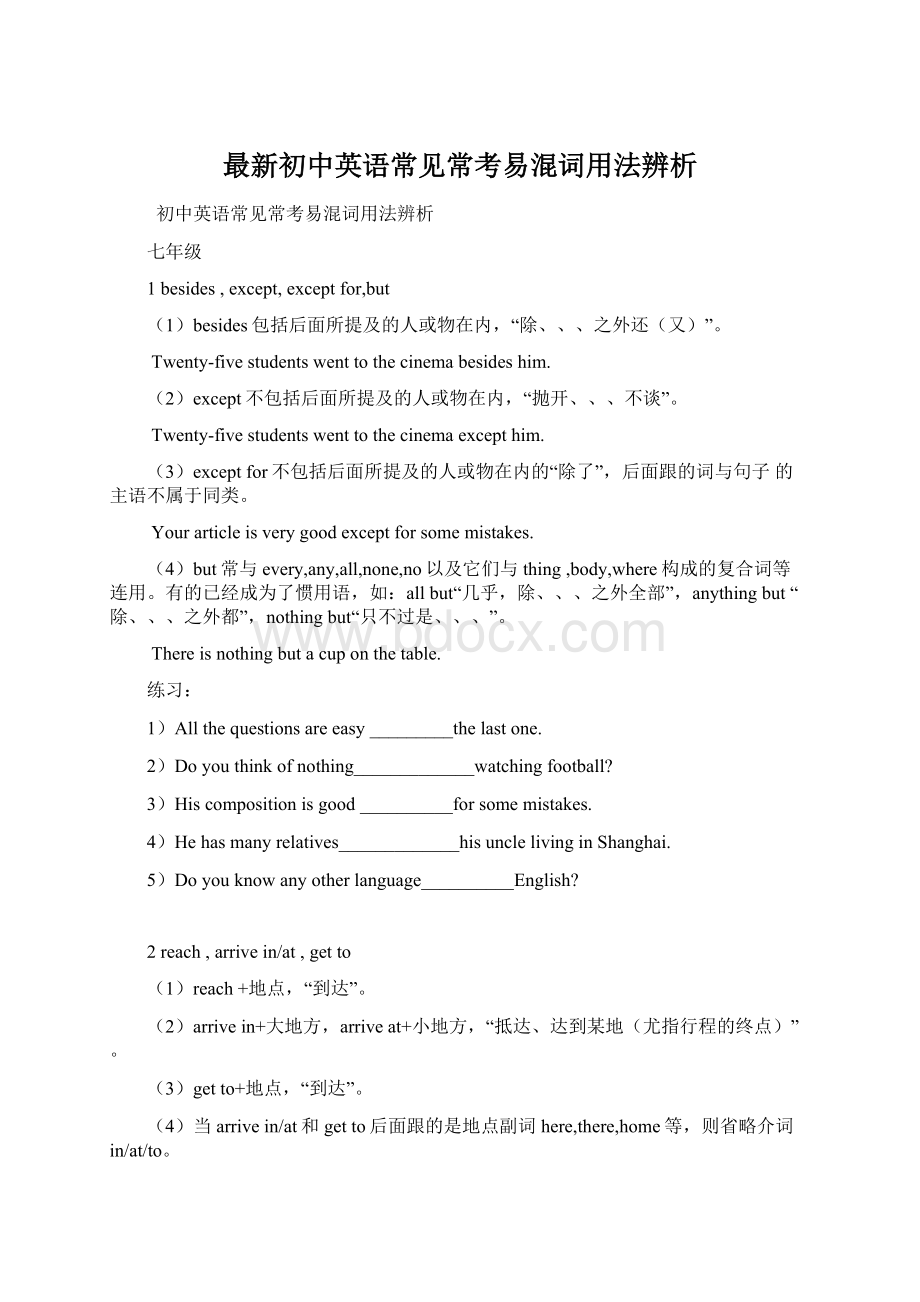最新初中英语常见常考易混词用法辨析.docx
《最新初中英语常见常考易混词用法辨析.docx》由会员分享,可在线阅读,更多相关《最新初中英语常见常考易混词用法辨析.docx(23页珍藏版)》请在冰豆网上搜索。

最新初中英语常见常考易混词用法辨析
初中英语常见常考易混词用法辨析
七年级
1besides,except,exceptfor,but
(1)besides包括后面所提及的人或物在内,“除、、、之外还(又)”。
Twenty-fivestudentswenttothecinemabesideshim.
(2)except不包括后面所提及的人或物在内,“抛开、、、不谈”。
Twenty-fivestudentswenttothecinemaexcepthim.
(3)exceptfor不包括后面所提及的人或物在内的“除了”,后面跟的词与句子的主语不属于同类。
Yourarticleisverygoodexceptforsomemistakes.
(4)but常与every,any,all,none,no以及它们与thing,body,where构成的复合词等连用。
有的已经成为了惯用语,如:
allbut“几乎,除、、、之外全部”,anythingbut“除、、、之外都”,nothingbut“只不过是、、、”。
Thereisnothingbutacuponthetable.
练习:
1)Allthequestionsareeasy_________thelastone.
2)Doyouthinkofnothing_____________watchingfootball?
3)Hiscompositionisgood__________forsomemistakes.
4)Hehasmanyrelatives_____________hisunclelivinginShanghai.
5)Doyouknowanyotherlanguage__________English?
2reach,arrivein/at,getto
(1)reach+地点,“到达”。
(2)arrivein+大地方,arriveat+小地方,“抵达、达到某地(尤指行程的终点)”。
(3)getto+地点,“到达”。
(4)当arrivein/at和getto后面跟的是地点副词here,there,home等,则省略介词in/at/to。
(5)当只表明“到了”,而未表明地点时用arrive。
练习:
1)Mysister________schoolat7a.meveryday.
2)UncleLi__________NewYorkthedaybeforeyesterday.
3)Youcan___________therailwaystationbybus.
4)Myfather_________at8:
00thismorningbyairplane.
5)Howdidyou______________homeyesterdayafternoon?
6)Doyouhowto___________there?
7)Iwilltelyouhowto____________here,sodnotworry.
3attheendof,intheend,bytheendof
(1)attheendof指某段时间的结束或某段路程的终止处,“在、、、结束时”,“在、、、尽头”。
Ourschoolheldasportsmeetingattheendoflastterm.
Attheendofthisstreetyouwillfindabookshop.
(2)intheend相当于atlast,finally,“最后,终于”。
Intheendtheycaughtthethief.
(3)bytheendof用于过去完成时或将来时,“到、、、末为止”。
BytheendoflasttermwehavelearnedfiveEnglishsongs.
Thisquestionwillhavebeenansweredbytheendoftoday.
练习:
1)WewillhaveanEnglishexam_________________January.
2)Iamsureeverythingwillturnoutsatisfactory_______________.
3)________________themeeting,everyonestooduptogivetheapplause.
4)______________lastmonth,Ihadplantedthousandsftrees.
4it,one,that
(1)it代替上文所提到的那个事物,一般指物,不指人。
可以代替单数可数名词或不可数名词。
复数形式是they或them。
Ihave50yuan.Myunclegaveittomelastweek.
(2)one代替上文出现过的单数名词,以免重复。
泛指代人或物。
所指代的人或物属于同类事物中不同的一个,即替代的是一个带有不定冠词的可数名词的单数形式。
复数形式是ones。
Ihavelostmyoldwatch.Thisisanewone.
(3)that代替前面同类不同一的事物。
可以代替单数可数名词或不可数名词。
代替可数名词时,复数形式是those。
that不可以替代表示人的名词,它可以根据语义在后面加上一些定语,多数是of的短语;他的前面不能存在任何定语。
Thewaterinwellsiscleanerthanthatintherivers.
练习:
1)DoyouneedanEnglish-Chinesedictionary?
Ihave__________.
2)Thelanguageusedinadvertisementsdiffersfrom__________usedinordinaryreadings.
3)Thecolorofthejacketisbetterthan__________ofmine.
4)Isawonlyonemotorcarintheshop.Wouldyougoandbuy__________?
5)Maybeitistruethatwedonotknowwhatwehavegotuntilwelose_________.
5lookfor,lookup,find,findout
(1)lookfor“寻找”,强调找的过程。
(2)Lookup“查找”,强调查字典、电话号码。
(3)Find“找到,发现”,强调找的结果。
(4)Findout“查明,发现,了解”,指的是经过认真观察、调查或研究把某事或某物查出来、搞清楚,多用于复杂而不容易直接查出的情况。
练习:
1)I’m__________mywatch,butIcan’t________it.
2)Ifyoudonotknowthewords,youcan__________them_________inthedictionary.
3)I__________itdifficulttolearnEnglishwell.
4)Theteacherwantedto__________whohadbrokenthedoor.
6aswell,aswellas
(1)aswell相当于also,too“也,又”。
常放在句子末尾,无需用逗号与句子分开。
IamgoingtoLondonandmysisterisgoingaswell.
(2)aswellas“也,还”。
常用来连接两个并列的成分。
连接连个并列的主语时,谓语动词与前面的主语保持一致;翻译时先翻译后面,在翻译前面。
Yourwifeaswellasyouisfriendlytome.
练习:
1)Theteachers_____________thestudentsareworkingovertime.
2)Theyplayedallkindsofinstrumentsandsang___________.
7ratherthan,insteadof,inplaceof
(1)ratherthan和would连用时构成wouldrather...than...“宁愿、、、而不愿、、、”的句式,表示主观愿望,在两者中择一。
Shewouldratherdiethanloseherchildren.
ratherthan不和would连用时,表示客观事实,“是、、、而不是、、、;与其、、、不如、、、”。
它的并列成分可以是名词,代词,形容词,介词(短语),动名词,分句,不定式,动词等等。
Ratherthan连接两个主语时,谓语动词应该和前面的主语保持一致。
Ratherthan连接两个不定式时,不定式可以带to,也可以不带to。
Heisanexplorerratherthanasailor.
YouratherthanIaregoingtogocamping.
Idecidedtowriteratherthan(to)telephone.
(2)insteadof“代替”,“做、、、而不做、、、”。
Myparentsjustcalledme.I’mafraidIhavetohavedinnerwiththeminsteadofshoppingwithyoutonight.
(3)inplaceof“代替”。
着重强调一种物质替换另一种物质。
Plasticsarenowoftenusedinplaceofwoodormetal.
练习:
1)Heran___________walked.
2)_______________makingprogress,myworkactuallyseemstobegoingbackwards.
3)Williamtalkedatthemeeting____________themanagerwhowassick.
8alive,living
(1)alive“活着的,有生命的”,和系动词be连用,着重表示一种状态,作表语。
Hewasstillaliveafterthecaraccident.
(2)Living“有生命的,生活的”,在句子中作定语,放在所修饰的名词的前面或代词的后面。
Therearenolivingthingsonthemoon.
练习:
1)TheGeneralwascaught_________bytheenergy.
2)Youcanaskhimaboutit.Heisa____________dictionary.
9sound,voice,noise
(1)sound指的是自然界的一切声音,是声音的总称;
(2)Voice指的是说话人的声音;
(3)Noise指的是噪音。
Therewasastrangesoundoutside.
Shehasabeautifulvoice.
Don’tmakesomuchnoise.
练习:
1)Atmidnightheheardastrange__________fromthenextroom.
2)Don’tmakeany___________inclass.
3)Whentheteachercameintotheclassroom,ourmonitorspokeinaloud_______,“standup”.
10say,speak,talk,tell
(1)say+内容(+语言),“说”。
Saygoodbye/aword.
SayitinEnglish,please.
Canyouunderstandwhatshesaid.
(2)speak+语言,“讲话”。
WouldyoupleasespeakChinese,please?
Ican’tunderstandyou.
(3)talk“讲话,谈论,谈话”。
talkto/with/about
Theyweretalkingaboutafilmwhentheteachercamein.
(4)tell“告诉,讲述”。
tell+抽象的整体tellastory
tellsthtosb,tellsb(about)sth,tellsb(not)todosth
I’lltellherthenewsassoonasIseeher.
练习:
1Jack:
I'mgoingto_______astorytomystudentsthisafternoon.
Jessica:
Areyougoing_____itinChineseorinEnglish?
Atell,sayBsay,tellCtell,speakDtell,tell
2HisparentsareChinese,buthecan’t_________Chinese.
AtellBsayCtalkDspeak
3MissWhiteoften________us“Nevergiveup!
”
AtellsBspeaksCsaysDtalks
4Mymother_____metobuysomeapplesonmywayhometoday.
AspokeBtalkedCtoldDsaid
5Mary________astoryinEnglishinclassyesterdaymorning.
AsaidBspokeCtalkedDtold
6Please________goodbyetotheteacher.
AtellBsayCtalkDspeak
7Tomis_____withMissLiintheclassroom.
AspeakingBsayingCtalkingDtelling
8Weoften________aboutmoviestarsafterclass.
AsayingBtellingCspeakingDtalking
9Hewasveryangryandhedidn’t______aword.
AsayBtalkCspeakDtell
10JanetisfromAustralia.Shecantellastory_______EnglishandChinese.
AspeakBsayCtalkDin
11beusedtodosth,beusedtodoingsth,usedtodosth
(1)beusedtodosth是usesthtodosth的被动语态,“被用来做、、、”
Nowadays,robotsareusedtodosomedangerousthingsinsteadofhuman.
(2)be/getusedtodoingsth“习惯于做、、、”,be/get是系动词,used是形容词,to是介词。
Themanwasusedtolivinginthecountryside.
(3)usedtodosth“过去常常做、、、”。
Whenhewasayoungboy,heusedtoasklotsofquestions,forexample,”Howdoesdarknesshappen?
”
练习:
1)I___________liveinLondon,butnowIamlivinginParis.
2)Theknife______________cutthings.
3)He________________livingaloneseveralmonthslater.
12befamousfor,befamousas
(1)befamousfor相当于beknownfor“以、、、、而闻名”。
Thetownisfamousforitsbeautifulscenery.
(2)befamousas“作为、、、出名;以、、、身份而闻名”。
ZhouJielunisfamousasasinger.
练习:
France_____________________hisfinefoodandwine,
ThomasEdison_____________________agreaterinventor.
13watchingsbdosth,watchsbdoingsth
(1)watchsbdosth“看见某人做过、、、”,强调动作的全过程。
Iwatchthethiefstealthebookfromthedesk.
Didshewatchthechildrencrosstheroad?
(2)watchsbdoingsth“看见某人正在做、、、”。
强调动作正在进行。
Iwatchthethiefstealingthebookfromthedesk.
Shewatchedthechildrencrossingtheroad.
(3)类似用法的词有see,hear等。
练习:
1我看见小明正在教室写作业。
_______________________________________________
2老师看着孩子们过马路了吗?
________________________________________________
14cross,across,through
(1)cross是动词,across和through是介词。
Theycrossedtheriverbytheboat.
(2)across“横穿,横过”,指的是从物体的表面上穿过。
Iswamacrosstheriver20yearsago.
(3)through“贯通,直穿,透过”,指的是立体空间中的穿过。
Theywalkedslowlythroughthewoods.
Thesunshineshoneinthebedroomthroughthewindow.
练习:
1)Go__________theroad,andyouwillseethepostofficeonyourleft.
2)Thesunlightcomes___________theglass.
3)Becarefulwhenyou____________thestreet.
15inaway,inthisway,bytheway,ontheway
(1)inaway“在某种程度上;在某种意义上”。
Inaway,itisagoodbook.
(2)Inthisway“用这种办法”。
Inthisway,youcanspeakEnglishwell.
(3)Ontheway“在路上,在途中”。
Onthewayhomemyfathertoldmeastory.
(4)Bytheway“顺便说”。
Bytheway,haveyouseenthefilmbefore?
练习:
1)______________,doyouhaveanyideawherethepostofficeis?
2)Sheis_______________tothepark.
3)Theworkshouldbedone_____________.
4)__________,hewasright.
16.Stoptodosth,stopdoingsth
(1)stoptodosth停下来去做某事。
Assoonastheteacherleft,studentsstoppedtotalk.
(2)stopdoingsth停止做某事。
Thestudentsstoppedtalkingassoonastheysawtheteacher.
(3)stop....fromdoingsth阻止、、、做、、、
Pleasestopthemfromplayingfire.
练习:
1)weshould______________(cut)downtrees.
2)HewatchedTVforhalfanhour.At8:
00he________________(do)hishomework.
3)He_________________(watch)TVandbegantoreadEnglish.
17takepartin,joinin,join
(1)takepartin“参加”,指的是参加群众性活动或会议,并在其中起一定的作用。
Thesedays,studentstakepartinmanyactivities.
(2)join“参加,加入”,指的是加入组织、团体、党派等,成为其中的一员。
Hejoinedthearmyin1998andjoinedthePartythenextyear.
(3)joinin“参加某活动”,后面跟的宾语一般是表示竞赛,游戏,娱乐等活动的名词,常用语joinsbin(doi